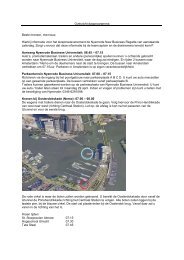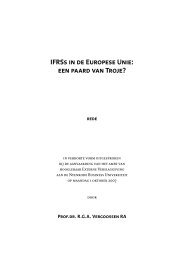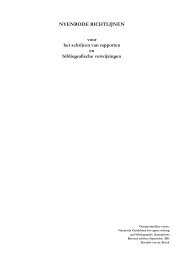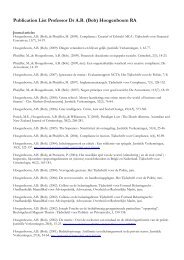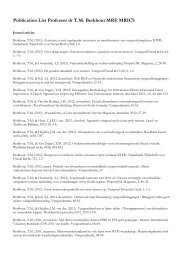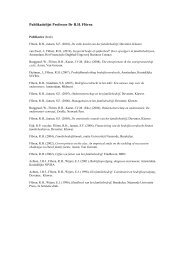pdf - Nyenrode Business Universiteit
pdf - Nyenrode Business Universiteit
pdf - Nyenrode Business Universiteit
You also want an ePaper? Increase the reach of your titles
YUMPU automatically turns print PDFs into web optimized ePapers that Google loves.
94 CHAPTER 4. OPPORTUNISM MITIGATION EFFECTIVENESS<br />
unit manager. A situation characterised by high goal ambiguity can be exploited by a selfinterested<br />
manager. Ambiguous goals provide the manager with room to argue for his own<br />
preferred course of action, which may not be aligned with the goals of the firm. Therefore,<br />
this study considers goal ambiguity as the second facilitator of managerial opportunism. I<br />
formalize this expectation as follows: goal ambiguity has a positive effect on the room for<br />
managerial opportunism.<br />
Measurability of Outputs The third opportunism-driving factor in the model is measurability<br />
of outputs, which refers to the degree to which an organization can measure its<br />
output in a reasonably undistorted manner. If the measurability of outputs is high, the<br />
business unit’s output metrics correspond well with the actual goals that the business unit<br />
needs to accomplish. High levels of output measurability facilitate the manager’s ability to<br />
communicate goal achievement to his superiors. However, if the measurability of outputs is<br />
low, monitoring becomes more difficult (Ouchi 1979, Langfield-Smith & Smith 2003). Because<br />
the actions of the business unit manager are less observable under conditions of low<br />
output measurability, low measurability creates leeway for the manager to act opportunistically<br />
without being caught by his superior. Based on this reasoning, this study argues<br />
that a low level of output measurability increases the room that managers have to behave<br />
opportunistically. This expectation is formalised as follows: measurability of outputs has a<br />
negative effect on the room for managerial opportunism.<br />
Decentralization of Decision Rights Decentralization of decision rights refers to decisions<br />
at the business unit level concerning, for example, the business unit’s investments<br />
or marketing choices. If an organization transfers decision rights from the CEO to the<br />
business unit manager, the business unit manager has more room to engage in opportunistic<br />
behaviour. The choices that are in the BU manager’s best interest are not necessarily<br />
in the organization’s best interest. For example, the business unit manager may choose to<br />
implement projects that he finds interesting but that are not in the firm’s best interest.<br />
Additionally, the manager might exploit the firm’s high-quality brand name to market the<br />
business unit’s lower-quality products to maximize the BU’s profits and/or the manager’s<br />
individual bonus. By delegating the decision rights to the BU manager, the organization<br />
provides the manager an opportunity to make self-interested decisions. Therefore, this<br />
study argues that the decentralization of decision rights increases the room for managerial<br />
opportunism. The final expectation in this study is formalized as follows: decentralization<br />
of decision rights has a positive effect on the room for managerial opportunism.<br />
4.2.3 Summary of the Model<br />
The model, which consists of the research hypothesis and the additional expectations, is<br />
summarized in figure 4.2.





